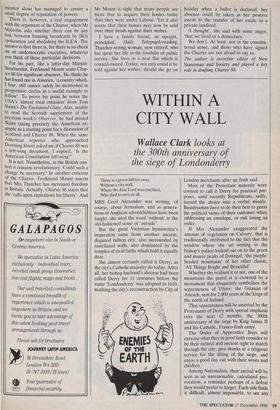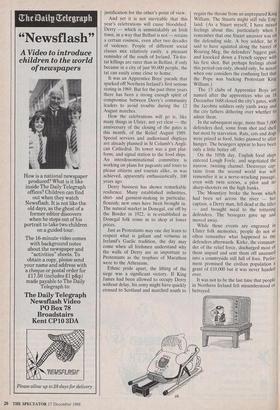WITHIN A CITY WALL
Wallace Clark looks at
the 300th anniversary of the siege of Londonderry
There is a green hill far away. Without a city wall, Where the dear Lord was crucified, Who died to save us all.
MRS Cecil Alexander was writing, of course, about Jerusalem, and as genera- tions of Anglican schoolchildren have been taught, she used the word 'without' in the old-fashioned sense of 'outside'.
But the great Victorian hymnwriter's inspiration came from another ancient, disputed hilltop city, also surrounded by castellated walls, also dominated by the temples of rival faiths which hold it equally dear.
She almost certainly called it Derry, as the city's Catholic majority do today. After all, her bishop husband's diocese had been called Derry for 11 centuries before the name 'Londonderry' was adopted in 1610, marking the city's reconstruction by City of
London merchants after an Irish raid.
Most of the Protestant minority were content to call it Derry for practical pur- poses, until recently Republicans, sadly, turned the choice into a verbal missile. Businessmen have to do their best to guess the political views of their customer when addressing an envelope, or risk losing an order.
If Mrs Alexander exaggerated the amount of vegetation on Calvary, that is traditionally attributed to the fact that the window where she sat writing in the bishop's palace looked out on to the green and mauve peaks of Donegal; 'the Purple- headed mountains' of her Other classic, 'All Things Bright and Beautiful'.
Whether she realised it or not, one of the mountains she gazed at is crowned by a monument that eloquently symbolises the separateness of Ulster: the Grianan of Aileach, seat for 2,000 years of the kings of the north of Ireland.
That separateness will be asserted by the Protestants of Derry with special emphasis over the next 12 months, the 300th anniversary of the siege by King James II and his Catholic, Franco-Irish army.
The Order of Apprentice Boys will exercise what they in good faith consider to be their natural and ancient right to march through the city, give thanks at a religions service for the lifting of the siege, and enjoy a good day out with their wives and children.
Among Nationalists, their arrival will be seen as an unreasonable, calculated pro- vocation, a reminder perhaps of a defeat they would prefer to forget. Each side finds it difficult, almost impossible, to see any justification for the other's point of view.
And yet it is not inevitable that this year's celebrations will cause bloodshed. Derry — which is unmistakably an Irish town, in a way that Belfast is not — retains a certain cosiness, even after two decades of violence. People of different social classes mix relatively easily, a pleasant reminder of the south of Ireland. Tit-for- tat killings are rarer than in Belfast, if only because in a city of just 90,000 people, the tat can easily come close to home.
It was an Apprentice Boys' parade that sparked off Northern Ireland's first serious rioting in 1969. But for the past three years there has been a strong enough spirit of compromise between Derry's community leaders to avoid trouble during the 12 August marches.
How the celebrations will go is, like many things in Ulster, not yet clear — the anniversary of the closing of the gates is this month, of the Relief August 1989. Special services and audiovisual displays are already planned in St Columb's Angli- can Cathedral. Its tower was a gun plat- form, and signal station to the food ships. An interdenominational committee is working on plans for pageants and tours to please citizens and tourists alike, as was achieved, apparently enthusiastically, 100 years ago.
Derry business has shown remarkable resilience. Many established industries, shirt- and garment-making in particular, flourish; new ones have been brought in. The natural market in Donegal, cut off by the Border in 1922, is re-established as Donegal folk come in to shop at lower prices.
Just as Protestants may one day learn to respect what is gallant and virtuous in Ireland's Gaelic tradition, the day may come when all Irishmen understand why the walls of Derry are as important to Protestants as the trophies of Marathon were to the Athenians.
Ethnic pride apart, the lifting of the siege was a significant victory. If King James had been allowed to occupy Derry without delay, his army might have quickly crossed to Scotland and marched south to
regain the throne from an unprepared King William. The Stuarts might still rule Eng- land. (As a Stuart myself, I have mixed feelings about this; particularly when I remember that one Stuart ancestor was on the defending side. A boy soldier, he is said to have squinted along the barrel of Roaring Meg, the defenders' biggest gun, and knocked down a French sapper with his first shot. But perhaps feelings about this period can only, should only, be mixed when one considers the confusing fact that the Pope was backing Protestant King William.)
The 13 clubs of Apprentice Boys are named after the apprentices who on 18 December 1688 closed the city's gates, with the Jacobite soldiers only yards away and the city fathers dithering over whether to admit them.
In the subsequent siege, more than 5,000 defenders died, some from shot and shell but most by starvation. Rats, cats and dogs were prized as food, hides gnawed to allay hunger. The besiegers appear to have been only a little better off.
On the 105th day, English food ships entered Lough Foyle, and negotiated the narrow, twisting channel. Destroyer cap- tains from the second world war will remember it as a nerve-wracking passage, even with twin screws, a pilot and 110 sharp-shooters on the high banks.
The Mountjoy broke the boom which had been set across the river — her captain, a Derry man, fell dead at the tiller — and brought meal to the tottering defenders. The besiegers gave up and moved away.
While those events are engraved in Ulster folk memories, people do not so often remember what happened to the defenders afterwards. Kirke, the comman- der of the relief force, discharged most of them unpaid and sent them off unarmed into a countryside still full of foes. Parlia- ment promised the civilian population a grant of £10,000 but it was never handed over.
It was not to be the last time that people in Northern Ireland felt misunderstood of betrayed.



























































 Previous page
Previous page